How To Be A Great Leader: 10 Helpful Articles For Business Students
These quick-read articles give online business degree students valuable insight into what it takes to be a great leader.

These quick-read articles give online business degree students valuable insight into what it takes to be a great leader.


Do you want to become a great leader?
Of course you do!
Earning your online business degree in management is a great first step. But don't stop there.
Take in all you can.
Soak up advice. Listen. Observe.
You'll learn a lot – about what to do, and what not to do; about emotional intelligence and why leaders fail. About what makes some leaders – Steve Jobs, Tony Hsieh, Phil Jackson – truly great, and the "diseases" of leadership that can weaken an organization.
You'll be provoked to think – sometimes in a different way.
Enjoy these great reads, and let us know if there are any articles you'd add to the list.
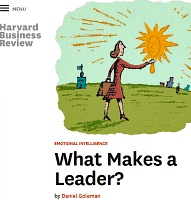
1. What Makes a Leader?
Daniel Goleman, Harvard Business Review
According to psychologist Daniel Goleman, while the qualities traditionally associated with leadership – such as intelligence, toughness, determination and vision – are necessary for success, they aren't enough. Truly effective leaders also have a high degree of emotional intelligence, which includes self-awareness, self-regulation, motivation, empathy for others and social skill. Goleman's article describes each of the components of emotional intelligence and discusses how to recognize it in potential leaders, how and why it connects to performance, and how it can be learned.
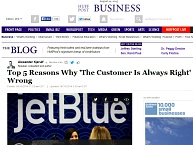
2. Top 5 Reasons Why 'The Customer is Always Right' is Wrong
Alexander Kjerulf, Huffington Post
Ever since the phrase "The customer is always right" was coined by the founder of Selfridge's department store in 1909, business have used it to convince customers they will get good service and to convince employees to give good service. Kjerulf argues that businesses should abandon the phrase altogether because it actually leads to worse customer service. He gives five reasons why, such as: "It gives abrasive customers an unfair advantage," and "It makes employees unhappy." Kjerulf says any business needs to put its people first – and they, in turn, its people will put customers first.
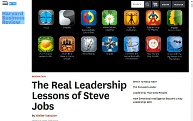
3. The Real Leadership Lessons of Steve Jobs
Walter Isaacson, Harvard Business Review
Walter Isaacson, author of the best-seller Steve Jobs, believes commentators attempting to draw management lessons from his book often erroneously fixate on the rough edges of Job's personality. The real lessons, Isaacson says, come from what Jobs actually accomplished – building the world's most valuable company and transforming several industries. In this article, Isaacson describes what he considers the 14 keys to Jobs' success, including: "Take responsibility end to end," and "Engage face-to-face."

4. The Top 10 Reasons Leaders Fail
Jack Stark, cnbc.com
Jack Stark believes the key to being successful and a great leader is to not have too many flaws and especially no fatal flaws. The cause of fatal flaws, he explains, is twofold – one moral and one psychological. Stark cites 10 key reasons – based on thousands of interviews, interventions and therapy – why leaders fail. His list includes greed, paranoia, narcissism, moral deficiencies, manic behavior, addictions and insecurity, among other reasons.
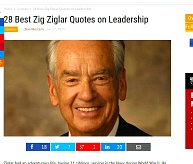
5. The 28 Best Zig Ziglar Quotes on Leadership
Dan Western, Wealthy Gorilla
"If you aim at nothing, you will hit it every time." Zig Ziglar, the top salesman in several organizations before going out on his own as an author, trainer and motivational speaker, amassed a following of millions inspired by his lessons for success. His short quotes were legendary, and for many, life changing. In this article, Dan Western shares what he believes are Ziglar's 28 best quotes on leadership – left behind after Ziglar's passing in 2012.
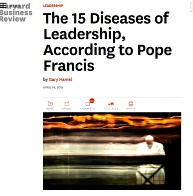
6. 15 Diseases of Leadership, According to Pope Francis
Gary Hamel, Harvard Business Review
Pope Francis, Time magazine's Person of the Year for 2013, made no secret of his intention to reform the Catholic Church at the start of his papacy. In his 2014 address to church leaders, he spoke bluntly about the "diseases" of leadership, such as arrogance, intolerance and myopia. Left untreated, he says, these diseases can weaken an organization. In this article, Gary Hamel translates the Pope's address into corporate-speak, making the Pope's counsel relevant to leaders everywhere.
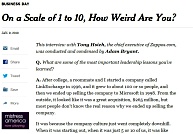
7. On a Scale of 1 to 10, How Weird Are You?
Adam Bryant, New York Times
Tony Hsieh, the CEO of Zappos.com, sold LinkExchange, the company he co-founded, to Microsoft for $265 million – he was 24 at the time. He then joined Zappos.com as an advisor and investor, eventually becoming CEO, where he helped grow the company from almost no sales to more than $1 billion annually. In this article, Adam Bryant interviews Hsieh about leadership and the very different kind of corporate culture he created at Zappos – a powerful model for achieving success and happiness.

8. The Most Successful Leaders Do 15 Things Automatically Every Day
Glenn Llopis, Forbes
If you want to be a successful leader in the workplace, Glenn Llopis says there are 15 things you must do automatically, every day, such as: Make others feel safe to speak up; communicate expectations; measure and reward performance; and genuinely enjoy responsibilities. These 15 things, Llopis says, give leaders the power to increase the value of their organization's brand, while minimizing operating risk. Further, he says, they help foster talent and culture, paving the way for results.
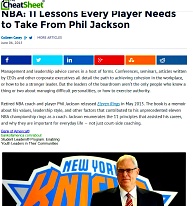
9. NBA: 11 Lessons Every Player Needs to Take From Phil Jackson
Colleen Casey, The Cheat Sheet
Lessons in leadership come in many forms and from many places. In this article, Colleen Casey enumerates on the 11 principles that retired NBA coach and player Phil Jackson credits with contributing to his unprecedented 11 NBA championship rings as a coach. The lessons, such as: Bench the ego; let each player discover his own destiny; keep your eye on the spirit, not the scoreboard; and forget the ring, aren't limited to the courtside. They can be applied to most any organization as well as to everyday life.
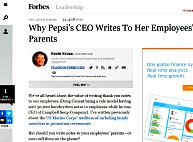
10. Why Pepsi's CEO Writes to Her Employees' Parents
Kevin Kruse, Forbes
PepsiCo CEO Indra Nooyi, one of Forbes' 10 most powerful women on the planet, takes a wholehearted approach to leadership – including writing to the parents of each of her direct reports so they can experience pride in their children, and calling a job candidate's mother on the phone. In this article, Kevin Kruse discusses Nooyi's unconventional approach to strengthen relations with employees and increase engagement.
Have you read a great article about leadership lately that you would recommend?
Image credit: Serg64 on Shutterstock.com